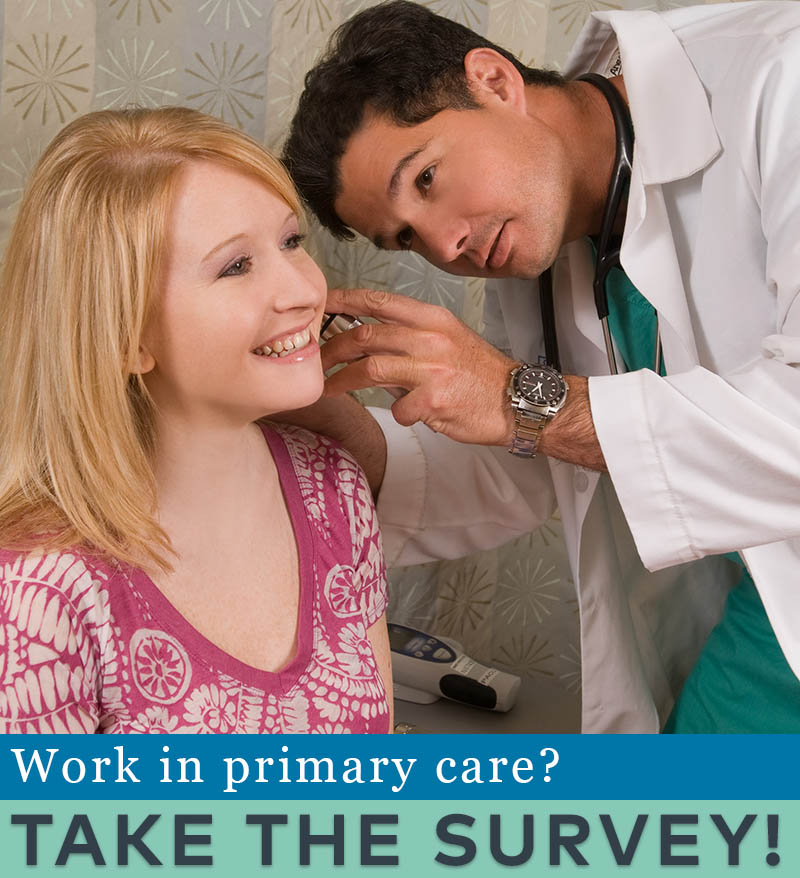WASHINGTON, October 11, 2021—Recently released data from a survey of primary care clinicians in mid-August by the Larry A. Green Center, in collaboration with the Primary Care Collaborative (PCC), shows that primary care remains resilient against increased demands, although the workforce is confronting myriad challenges. Responding clinicians reported that the needs of patients exceeded pre-pandemic levels, and for nearly two-thirds of clinicians (64%), telemedicine was a key way to maintain patients’ access to care.
Although primary care has continued to rely highly on telemedicine, the survey also showed that clinicians have concerns about its continued high use. If pre-pandemic payment regulations are restored, 41% of clinicians worry their practice will no longer be able to support telemedicine. The potential loss of this adaptive tool would be another challenge for a workforce in which more than half report mental exhaustion is a constant worry as both COVID-19 and patients’ needs surged during the summer.
Clinicians also cited growing pressures of providing care during the summer surge. More than 7 in 10 (71%) said patient visits were more complex and took more time, 54% said they were unable to hire staff for open positions in their practice, and 45% said they personally knew primary care clinicians who had retired early or left practice because of the pandemic.
On the COVID-19 vaccine front, 52% of clinicians said two to three conversations were needed to change the mind of vaccine-hesitant patients, and each conversation took several minutes. In addition, more than two-thirds (67%) said that for most of their vaccine-hesitant patients, it’s a gut or political opinion that cannot be changed.
“With no cash infusion and without regard to future payment concerns, primary care tended to the health needs of the nation during the pandemic and continues to do so,” said Rebecca Etz, PhD, co-director of The Larry A. Green Center. “Despite poor resources, a shrinking workforce and the growing complexity of health burdens of patients, primary care expanded its services to provide the safety net so many were lacking. When will this nation – and its leaders – wake up to the fact that primary care is key to getting us out of this prolonged pandemic?”
Clinicians revealed moderate successes in administering COVID vaccines. Nearly 6 in 10 (59%) said they had patients who were asking for a third vaccine shot/booster, about one in three (34%) said they had found more patients requesting the vaccine because of fear of the delta variant, and more than half (51%) said their practice had received an adequate supply of vaccines for their patients. However, less than a third (31%) said vaccinating patients was common in their practice – part of routine care.
“We are calling upon public and private payers to step up to help meet patients’ needs and safeguard the primary care workforce,” said Ann Greiner, PCC’s President and CEO. “Left with the most difficult-to-vaccinate portion of the population, primary care clinicians must be adequately supported for the multiple conversations that are needed to counter vaccine hesitancy and help meet our country’s vaccine goals.”
Since March 2020, the Larry A. Green Center and the PCC have collected and disseminated data from 30 surveys of primary care clinicians on their abilities and attitudes in responding to the COVID-19 pandemic.
The survey was conducted August 13-17, 2021. Responses came from 1,263 clinicians in 49 states, Washington, D.C., and two territories: Specialties: 72% family medicine, 13% internal medicine, 5% pediatrics, 3% geriatrics, 7% other. Type: 69% MDs, 8% DOs, 13% NPs, 3% PAs, 7% other. Settings: 26% community health centers or similar, 23% rural, 18% residencies. Practice size: 26% had 1-3 clinicians, 43% had more than 10 clinicians. Ownership: 26% self-owned, 43% system-owned, 6% government-owned, 3% membership-based.
More information about the survey
###
- Ann Greiner, president and CEO of the Primary Care Collaborative
- Rebecca Etz, PhD, co-director of The Larry A. Green Center
If you would like to speak with them, please contact Stephen Padre (Primary Care Collaborative's communications manager), spadre@thepcc.org, 202-417-3911
About The Green Center:
The The Larry A. Green Center for the Advancement of Primary Health Care for the Public Good is a research group founded by Rebecca Etz, PhD at Virginia Commonwealth University and Kurt Stange, MD, PhD at Case Western Reserve University. The Green Center works to reclaim and reconstitute the intellectual foundations of primary care, to advance the science of medicine learned and practiced within layered and competing social frameworks of meaning, and to deliver on a now 50-year-old promise: better health and improved health care through a synergistic focus on both humanism and healing. We are nimble, inquisitive, curious, and open. We make personal doctoring and innovation visible.

Are you a physician, nurse practitioner, or PA working in primary care?
Help PCC and the Larry A. Green Center track how your practice is responding to the COVID-19 outbreak by completing the Green Center's occasional survey.
The regular surveys are no longer being conducted.
Recent News
August 16, 2024
August 12, 2024
July 16, 2024
Reform of #primarycare needs to start with how we pay for it (an aim of our Better Health - Now campaign). Here's a… https://t.co/37m6sgtUbW —
2 years 6 months ago
"Primary care clinicians must have the flexibility to create new models of care--including longer visits, group vis… https://t.co/eHEpkWTkV0 —
2 years 6 months ago
Do you know what empanelment is? No, it's not related to being imprisoned, but it's the topic of our monthly webina… https://t.co/qCi5Hwe6rJ —
2 years 6 months ago
Secondary menu
Copyright © 2024 Primary Care Collaborative



